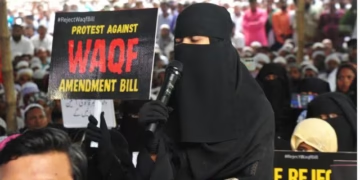April 16, 2025 – Across several Indian states, a wave of protests has emerged in response to growing concerns over the Waqf Act, with citizens alleging land encroachments and lack of transparency. The issue has sparked widespread debate, fuelling anxiety and heightening communal tensions in several regions.
The Waqf Act, originally enacted to manage properties donated for religious or charitable purposes in the Muslim community, has come under renewed scrutiny following viral social media posts and public claims that the Act grants disproportionate powers to Waqf Boards. Demonstrations have been reported in parts of Maharashtra, Madhya Pradesh, Karnataka, and Uttar Pradesh, with protestors demanding a repeal or overhaul of the Act.
“We are not against any community,” said Ravi Shankar, a protest organiser in Bhopal. “But how can private or public land suddenly be declared Waqf property without the owner’s knowledge? There must be accountability.”
The Waqf Boards, however, have refuted these claims, stating that the land in question is often historically designated as Waqf, and the boards are merely following due legal process. Experts also warn that much of the current outrage may be based on misinformation or misinterpretation of the law.
Legal scholar Dr. Nazneen Ahmed explains: “The Waqf Act is a complex piece of legislation, and while it may need reforms to increase transparency, the rhetoric around it is increasingly communal in tone, which is dangerous.”
Some activists and opposition leaders argue that the government’s silence is adding to the confusion. “There is a real fear on the ground, but it’s being amplified by rumours. The Centre must issue clear guidance and address public concerns before things escalate further,” said Priya Menon, a civil rights advocate.
Social media platforms have played a key role in mobilising protests, but they have also been criticised for spreading unverified claims. Several posts alleging arbitrary land seizures by Waqf Boards have gone viral, despite later being debunked by fact-checkers.
In the backdrop of an already polarised political climate, the protests have taken on a sharper edge, with calls for legislative reform often accompanied by communal undertones. Analysts warn that unless the issue is handled with transparency and sensitivity, it could deepen existing societal rifts.
As the protests continue to grow, the need for constructive dialogue between communities, lawmakers, and legal experts has never been more urgent. The challenge lies in separating legitimate legal concerns from political or communal agendas.
Also Read : India Justice Report 2025: Gender Imbalance in Policing – Less Than 1,000 Women















 Categories
Categories









